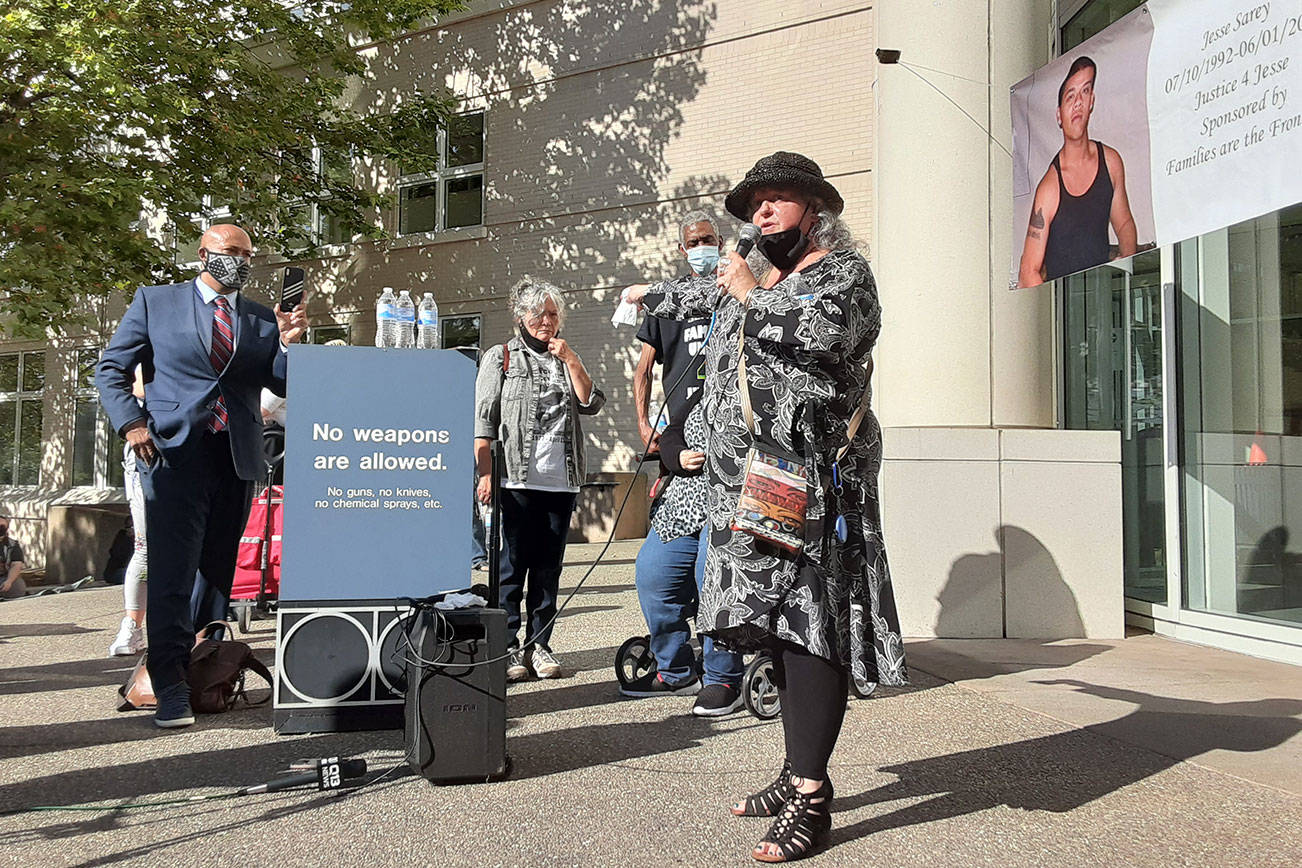It was a day 15 months in the making for the family of 26-year-old Jesse Sarey, who was shot twice and killed by Auburn Police Officer Jeff Nelson in north Auburn on May 31, 2019.
So said people assembled outside the Maleng Regional Justice Center on Aug. 24, where moments earlier, Nelson had become the first law enforcement officer in the state in three decades to face formal charges for shooting and killing another person.
“Today is making history in the state of Washington,” a jubilant Elaine Simons, former foster mother of Sarey for six months, said to a raucous response.
Nelson’s trial is likely months off, but those people now had hope that justice too long delayed or flat out denied may no longer be out of reach for the dead and for the anguished families and friends they left behind.
Among those in the crowd were loved ones of the late Renee Davis, Leonard Thomas, Giovonn Joseph-McDade, Charleena Lyles, Enosa Strickland Jr. and Isaiah Obet.
“When one family wins, we all win,” said Katrina Johnson, whose cousin, Charleena Lyles, who shot and killed by Seattle Police on June 18, 2017.
Among Johnson’s extended “we” was Sonia Joseph. A Kent police officer shot and killed her son, Giovonn Joseph McDade, on June 24, 2017.
“Today was an emotional day for me, for every single family here, because all of us want justice for our loved ones,” Joseph said. “We’ve been denied that over and over and over, and we’ll continue to fight and work toward police accountability.”
Muckleshoot Tribe member Renee Davis was five months pregnant when King County Sheriff’s deputies, who were doing a welfare check, shot and killed her in October 2016.
Davis’ foster sister, Danielle Bargala, credited Initiative 940 for getting things as far as they have gotten to date.
In 2019, Washington Gov. Jay Inslee unanimously approved revisions to the initiative, which state voters had passed the previous November to make it easier to prosecute police officers for negligent shootings.
The effect was to change language that determined when officers could be held liable for using deadly force. While I-940 in its original form would have required officers to show that they believed they’d acted in good faith when they applied deadly force, the new language imposed another test: whether another officer acting reasonably in the same circumstances would have believed deadly force was necessary.
“I want to thank every person that has worked on I-940 because this victory is a victory for every single person killed by the police. This victory is a victory for Renee. This victory is a victory for the Sarey family. This is change coming, and I am so, so proud to be here today,” said Bargala.
Kent native Po Leapai recalled his cousin, Iosia Faletogo, 36, whom a Seattle Police Officer shot and killed during a traffic stop on New Year’s Eve 2018. Faletogo left behind two boys under 10 years old, and the extended family is now helping to raise them.
“We just want justice,” Leapai said. “We haven’t gotten an inquest, we’ve been dismissed and treated very insensitively by (the Seattle Police Officers Guild) and the Seattle (Police Department), and we’re praying for an inquest for my family so we can get justice for Iosia. I feel like we’re here because there’s been a lack of transparency and accountability.
“I don’t believe police prevent crimes,” Leapai added. “I believe that preventing crimes involves funding social programs and community programs and mental health and education, then we’ll alleviate the need for police presence in our neighborhoods.”
Fred Thomas’ son was shot and killed by a Lakewood police sniper seven years ago, while the young man was holding his 4-year-old son in his arms.
“We’re making history,” Thomas said. “But I want everyone to know, this is not a sprint, this is no longer a marathon, this is now a relay race, and this is just the first leg of that relay race. Yeah, he was charged, but now we’ve got to make sure that the charges stick. Now we’ve got to keep our voices going, because we all know, once the voices go away, once the cameras quit clicking, the police will go back to normal…Well, I-940 says, there is no more business as usual; it is a new day.”


